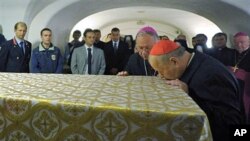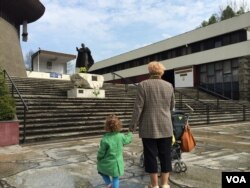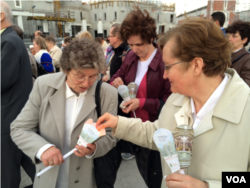KRAKOW, POLAND —
A few drops of the late Pope John Paul II's blood inspired passionate devotion from his followers, who lined up this week to kiss a golden reliquary containing it at the John Paul II Sanctuary.
The cathedral-like shrine, built on the outskirts of Krakow after his death in 2005, is hosting a week of prayer services and vigils leading up to the canonization of the Polish pope on Sunday at the Vatican.
The first day's event prominently featured the Knights of John Paul II, who presided over the blood-kissing ceremony.
"We have a chance to touch some part of the sanctity," explained Krzysztof Wasowski, the leader of the order, which is only open to men who are not divorced and live by the tenets of the religion.
John Paul II will be canonized in a ceremony at the Vatican along with a previous pope, John XXIII. But the latter is hardly mentioned in Poland, where there is intense excitement among Catholics. Their leaders hope the new Polish saint will help prevent the country from following a Western European-style path of secularization.
Also at the first Mass, a remembrance was offered by Cardinal Stanislaw Dziwisz, who was John Paul II's secretary and knew him well.
"He was a person who loved God and through God he loved every single person," he said in an interview afterward with VOA.
Poland is one of the most religious nations in Europe, and the late pope formerly known as Karol Wojtyla is a national hero.
As cardinal of Krakow, he supported the workers at the old Lenin steelworks in the Nowa Huta district in the east of the city, when they demanded a place to worship God in their supposed Communist paradise. The authorities' initial refusal to allow them to erect even a cross triggered riots.
Marian Kordaszewski helped build the Ark of the Lord Church - a soaring boat-like structure - with his bare hands, and he remembers Wojtyla's visits.
"He was angel in a human body, he was just good to the core," Kordaszewski recalled.
A society in transition
The ghost of John Paul II is all over Krakow, from the modernist church in Nowa Huta to the episcopal palace downtown, where he would talk to the crowds from a window above the entrance. Also from the house where he lived and met with his underground theater troupe, to the Jagiellonian University where he studied linguistics.
A group of elementary schoolchildren visiting the university fondly talked about the late "papierz" and what it means to be Catholic.
But Poland is a society in transition, and Magdalena Kozak, who is attending an academic conference at the linguistics department, thinks secularization cannot be stopped.
"Because the whole world is going this way!" she said. "Because we are getting more and more open to other cultures."
Olga Gorska, a 33-year-old Warsaw lawyer visiting Krakow with her German boyfriend, finds the veneration of John Paul to be exaggerated.
"I do not want to say that he is too much worshipped, but there is a kind of cult of him," she said.
The ceremonies at the John Paul II shrine will culiminate with an all-night vigil on Saturday and Mass on Sunday, following a live transmission of the canonization ceremony from Rome.
But judging from the faces of the people attending the ceremonies earlier this week - and of those at other churches in Krakow in the past few days - the late pope's most devoted followers are aging. Preserving the church's influence in Poland may be a lot to ask, even of a saint.
The cathedral-like shrine, built on the outskirts of Krakow after his death in 2005, is hosting a week of prayer services and vigils leading up to the canonization of the Polish pope on Sunday at the Vatican.
The first day's event prominently featured the Knights of John Paul II, who presided over the blood-kissing ceremony.
"We have a chance to touch some part of the sanctity," explained Krzysztof Wasowski, the leader of the order, which is only open to men who are not divorced and live by the tenets of the religion.
John Paul II will be canonized in a ceremony at the Vatican along with a previous pope, John XXIII. But the latter is hardly mentioned in Poland, where there is intense excitement among Catholics. Their leaders hope the new Polish saint will help prevent the country from following a Western European-style path of secularization.
Also at the first Mass, a remembrance was offered by Cardinal Stanislaw Dziwisz, who was John Paul II's secretary and knew him well.
"He was a person who loved God and through God he loved every single person," he said in an interview afterward with VOA.
Poland is one of the most religious nations in Europe, and the late pope formerly known as Karol Wojtyla is a national hero.
As cardinal of Krakow, he supported the workers at the old Lenin steelworks in the Nowa Huta district in the east of the city, when they demanded a place to worship God in their supposed Communist paradise. The authorities' initial refusal to allow them to erect even a cross triggered riots.
Marian Kordaszewski helped build the Ark of the Lord Church - a soaring boat-like structure - with his bare hands, and he remembers Wojtyla's visits.
"He was angel in a human body, he was just good to the core," Kordaszewski recalled.
A society in transition
The ghost of John Paul II is all over Krakow, from the modernist church in Nowa Huta to the episcopal palace downtown, where he would talk to the crowds from a window above the entrance. Also from the house where he lived and met with his underground theater troupe, to the Jagiellonian University where he studied linguistics.
A group of elementary schoolchildren visiting the university fondly talked about the late "papierz" and what it means to be Catholic.
But Poland is a society in transition, and Magdalena Kozak, who is attending an academic conference at the linguistics department, thinks secularization cannot be stopped.
"Because the whole world is going this way!" she said. "Because we are getting more and more open to other cultures."
Olga Gorska, a 33-year-old Warsaw lawyer visiting Krakow with her German boyfriend, finds the veneration of John Paul to be exaggerated.
"I do not want to say that he is too much worshipped, but there is a kind of cult of him," she said.
The ceremonies at the John Paul II shrine will culiminate with an all-night vigil on Saturday and Mass on Sunday, following a live transmission of the canonization ceremony from Rome.
But judging from the faces of the people attending the ceremonies earlier this week - and of those at other churches in Krakow in the past few days - the late pope's most devoted followers are aging. Preserving the church's influence in Poland may be a lot to ask, even of a saint.








